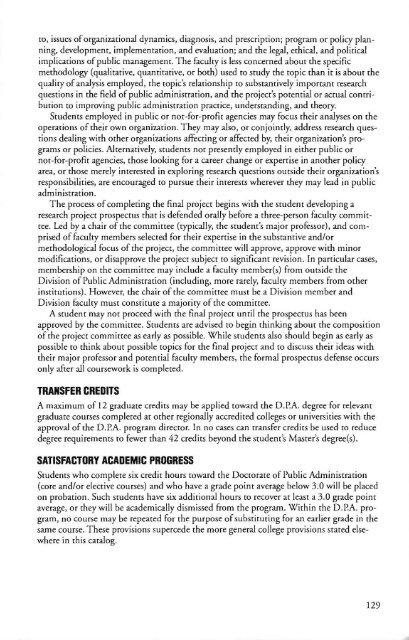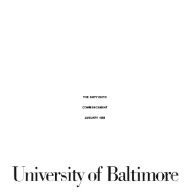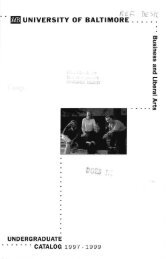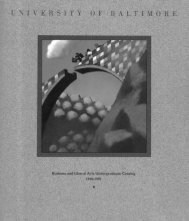2003-2005 - Special Collections - University of Baltimore
2003-2005 - Special Collections - University of Baltimore
2003-2005 - Special Collections - University of Baltimore
You also want an ePaper? Increase the reach of your titles
YUMPU automatically turns print PDFs into web optimized ePapers that Google loves.
to, issues <strong>of</strong>organizational dynamics, diagnosis, and prescription; program or policy planning,<br />
development, implementation, and evaluation; and the legal, ethical, and political<br />
implications <strong>of</strong> public management. The faculty is less concerned about the specific<br />
methodology (qualitative, quantitative, or both) used to study the topic than it is about the<br />
quality <strong>of</strong> analysis employed, the topic's relationship to substamively important research<br />
questions in the field <strong>of</strong> public administration, and the project's potential or actual contribution<br />
to improving public administration practice, understanding, and theory.<br />
Students employed in public or not-for-pr<strong>of</strong>it agencies may focus their analyses on the<br />
operations <strong>of</strong> their own organization. They may also, or conjointly, address research questions<br />
dealing with other organizations affecting or affected by, their organization's programs<br />
or policies. Alternatively, students not presently employed in either public or<br />
not-for-pr<strong>of</strong>it agencies, those looking for a career change or expertise in another policy<br />
area, or those merely interested in exploring research questions outside their organization's<br />
responsibilities, are encouraged to pursue their interests wherever they may lead in public<br />
administration.<br />
The process <strong>of</strong>completing the final project begins with the student developing a<br />
research project ptospectus that is defended orally before a three-person faculty committee.<br />
Led by a chair <strong>of</strong> the committee (typically, the student's major pr<strong>of</strong>essor), and comprised<br />
<strong>of</strong> faculty members selected for their expertise in the substantive and/or<br />
methodological focus <strong>of</strong> the project, the committee will approve, approve with minor<br />
modifications, or disapprove the project subject to significant revision. In particular cases,<br />
membership on the committee may include a faculty member(s) from outside the<br />
Division <strong>of</strong> Public Administration (including, more rarely, faculty members from other<br />
institutions). However, the chair <strong>of</strong> the committee must be a Division member and<br />
Division faculty must constitute a majority <strong>of</strong> the committee.<br />
A student may nOt proceed with the final project until the prospectus has been<br />
approved by the committee. Students are advised to begin thinking about the composition<br />
<strong>of</strong> the project committee as early as possible. While students also should begin as early as<br />
possible to think about possible topics for the final project and to discuss their ideas with<br />
their major pr<strong>of</strong>essor and potential faculty members, the formal prospectus defense occurs<br />
only after all coursework is completed.<br />
TRANSFER CREDITS<br />
A maximum <strong>of</strong> 12 graduate credits may be applied toward the D.PA. degree for relevant<br />
graduate courses completed at other regionally accredited colleges or universities with the<br />
approval <strong>of</strong> the D .PA. program director. In no cases can transfer credits be used to reduce<br />
degree requirements to fewer than 42 credits beyond the student's Master's degree(s).<br />
SATISFACTORY ACADEMIC PROGRESS<br />
Students who complete six credit hours coward the Doctorate <strong>of</strong> Public Administration<br />
(core and/or elective courses) and who have a grade point average below 3.0 will be placed<br />
on probation. Such students have six additional hours to recover at least a 3.0 grade point<br />
average, or they will be academically dismissed from the program. Within the D .PA. program,<br />
no course may be repeated for the purpose <strong>of</strong>substituting for an earlier grade in the<br />
same course. These provisions supercede the more general college provisions stated elsewhere<br />
in this catalog.<br />
129
















